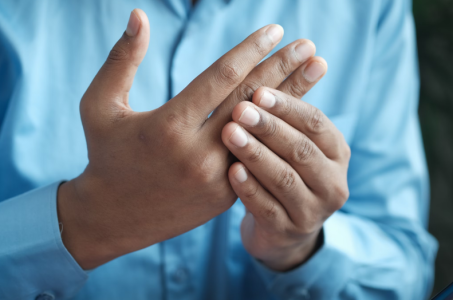Radio host Chris O’Keefe leads $6.9m victory against arthritis
By
Gian T
- Replies 6
Many individuals living with illnesses or diseases often choose to keep their struggles private, preferring not to share their experiences with the public.
However, opening up about these challenges can lead to positive outcomes that benefit others facing similar circumstances.
Sharing personal stories can foster understanding, support, and awareness within communities, offering solace and encouragement to those enduring similar health journeys.
In a heartening revelation that brought both awareness and hope, 2GB radio personality Chris O’Keefe shared his personal struggle with a condition that is often overlooked in children.
Chris O’Keefe, known for his dynamic presence on the airwaves, opened up about his childhood battle with juvenile arthritis, a condition that at times left him wheelchair-bound as he grappled with inflammation in every joint.
‘By the time I was 14 or 15, I was finally in remission, and I’ve hardly had a problem since then, that was 25 years ago,’ Mr O’Keefe said.
‘And guess what, in terms of being able to treat this thing, things haven’t got much better in terms of the resources across NSW.’
‘Do you know how many pediatric rheumatologists there are right now in the state of NSW? Full-time pediatric rheumatologists in the public system?’
‘How many would you think? One. Yep, a single doctor. That’s all there is to treat kids with arthritis. This is a disease that 10,000 Australian kids under the age of 16 are struggling with. It is clearly inadequate.’
A change that will impact many lives has been brought about by O’Keefe, who joined forces with 14-year-old Lucy Mathewson, who has also suffered from arthritis pain since infancy, and Ruth Colagiuri from the Juvenile Arthritis Foundation.
‘I couldn’t get up on my cot,’ Mathewson shared.
‘I was struggling to walk downstairs, and my parents realised, and they decided that they needed to figure out what was wrong with me because it was obviously not our growing pains or it wasn’t something that was normal.’
‘So I was taken to a doctor, and it took them over six months for me to be diagnosed fully.’
Even at present, the disease continues to significantly impact Mathewson's quality of life.
‘It has been… it’s been really hard for me to keep up with my peers because I can’t do a lot of things that they can do,’ she explained.
‘It has been hard with the pain management with schoolwork and honestly just focusing, and it’s just been really hard for me to adapt to this and live a normal life.’
Moved by these stories, NSW Health Minister Ryan Park announced a $6.9 million funding injection into juvenile arthritis research and treatment in the state's budget.
This funding is a beacon of hope for the estimated 10,000 Australian children under the age of 16 battling this debilitating disease.
The new funding promised to revolutionise the treatment landscape for juvenile arthritis in NSW.
It enabled the hiring of six senior clinicians, including two pediatric rheumatologists and a highly specialised allied health team, to provide statewide service.
Additionally, a pediatric rheumatology advanced trainee position will be created to deliver improved access to specialised care and ongoing monitoring for children with this condition.
‘Juvenile arthritis can be debilitating for people who are living with it, and this investment means more children will be able to access the specialist care they need through the statewide paediatric rheumatology service,’ Mr Park said.
‘Eighty per cent of children with juvenile arthritis experience pain daily, which can directly negatively impact their education and participation in physical activities.’
‘This is a critical investment. The earlier we can diagnose and treat juvenile arthritis, the better the patient outcome, and the reduced risk of permanent disability.’
The announcement has been met with gratitude and relief. Colagiuri foresaw the funding bringing juvenile arthritis treatment 'out of the dark ages and into the light’.
‘It’s miraculous,’ she said.
‘I’m going to burst into tears.’
In contrast to this news, O'Keefe pleaded guilty to drug driving, resulting in his license suspension.
He faced charges last year when a roadside saliva test in Sydney detected illicit drug use. More details on this story can be found here.
 Have you or someone you know experienced juvenile arthritis or any illness that makes everyday tasks challenging? Share your story with us in the comments below.
Have you or someone you know experienced juvenile arthritis or any illness that makes everyday tasks challenging? Share your story with us in the comments below.
However, opening up about these challenges can lead to positive outcomes that benefit others facing similar circumstances.
Sharing personal stories can foster understanding, support, and awareness within communities, offering solace and encouragement to those enduring similar health journeys.
In a heartening revelation that brought both awareness and hope, 2GB radio personality Chris O’Keefe shared his personal struggle with a condition that is often overlooked in children.
Chris O’Keefe, known for his dynamic presence on the airwaves, opened up about his childhood battle with juvenile arthritis, a condition that at times left him wheelchair-bound as he grappled with inflammation in every joint.
‘By the time I was 14 or 15, I was finally in remission, and I’ve hardly had a problem since then, that was 25 years ago,’ Mr O’Keefe said.
‘And guess what, in terms of being able to treat this thing, things haven’t got much better in terms of the resources across NSW.’
‘Do you know how many pediatric rheumatologists there are right now in the state of NSW? Full-time pediatric rheumatologists in the public system?’
‘How many would you think? One. Yep, a single doctor. That’s all there is to treat kids with arthritis. This is a disease that 10,000 Australian kids under the age of 16 are struggling with. It is clearly inadequate.’
A change that will impact many lives has been brought about by O’Keefe, who joined forces with 14-year-old Lucy Mathewson, who has also suffered from arthritis pain since infancy, and Ruth Colagiuri from the Juvenile Arthritis Foundation.
‘I couldn’t get up on my cot,’ Mathewson shared.
‘I was struggling to walk downstairs, and my parents realised, and they decided that they needed to figure out what was wrong with me because it was obviously not our growing pains or it wasn’t something that was normal.’
‘So I was taken to a doctor, and it took them over six months for me to be diagnosed fully.’
Even at present, the disease continues to significantly impact Mathewson's quality of life.
‘It has been… it’s been really hard for me to keep up with my peers because I can’t do a lot of things that they can do,’ she explained.
‘It has been hard with the pain management with schoolwork and honestly just focusing, and it’s just been really hard for me to adapt to this and live a normal life.’
Moved by these stories, NSW Health Minister Ryan Park announced a $6.9 million funding injection into juvenile arthritis research and treatment in the state's budget.
This funding is a beacon of hope for the estimated 10,000 Australian children under the age of 16 battling this debilitating disease.
The new funding promised to revolutionise the treatment landscape for juvenile arthritis in NSW.
It enabled the hiring of six senior clinicians, including two pediatric rheumatologists and a highly specialised allied health team, to provide statewide service.
Additionally, a pediatric rheumatology advanced trainee position will be created to deliver improved access to specialised care and ongoing monitoring for children with this condition.
‘Juvenile arthritis can be debilitating for people who are living with it, and this investment means more children will be able to access the specialist care they need through the statewide paediatric rheumatology service,’ Mr Park said.
‘Eighty per cent of children with juvenile arthritis experience pain daily, which can directly negatively impact their education and participation in physical activities.’
‘This is a critical investment. The earlier we can diagnose and treat juvenile arthritis, the better the patient outcome, and the reduced risk of permanent disability.’
The announcement has been met with gratitude and relief. Colagiuri foresaw the funding bringing juvenile arthritis treatment 'out of the dark ages and into the light’.
‘It’s miraculous,’ she said.
‘I’m going to burst into tears.’
In contrast to this news, O'Keefe pleaded guilty to drug driving, resulting in his license suspension.
He faced charges last year when a roadside saliva test in Sydney detected illicit drug use. More details on this story can be found here.
Key Takeaways
- GB radio star Chris O’Keefe shared his personal experience with juvenile arthritis, revealing he suffered from the disease during his childhood.
- NSW Health Minister Ryan Park announced a $6.9 million funding boost for juvenile arthritis in the state budget.
- The funding is set to finance six senior clinicians, including two pediatric rheumatologists, allied health professionals and a paediatric rheumatology advanced trainee position to enhance treatment across New South Wales.
- The investment is seen as crucial to helping children with juvenile arthritis, allowing better diagnosis treatment, and potentially reducing the risk of permanent disability.








